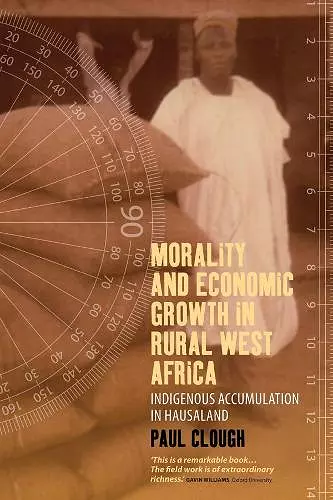Morality and Economic Growth in Rural West Africa
Indigenous Accumulation in Hausaland
Format:Hardback
Publisher:Berghahn Books
Published:1st Jun '14
Currently unavailable, and unfortunately no date known when it will be back

The land, labor, credit, and trading institutions of Marmara village, in Hausaland, northern Nigeria, are detailed in this study through fieldwork conducted in two national economic cycles - the petroleum-boom prosperity (in 1977-1979), and the macro-economic decline (in 1985, 1996 and 1998). The book unveils a new paradigm of economic change in the West African savannah, demonstrating how rural accumulation in a polygynous society actually limits the extent of inequality while at the same time promoting technical change. A uniquely African non-capitalist trajectory of accumulation subordinates the acquisition of capital to the expansion of polygynous families, clientage networks, and circles of trading friends. The whole trajectory is driven by an indigenous ethics of personal responsibility. This model disputes the validity of both Marxian theories of capitalist transformation in Africa and the New Institutional Economics.
“Clough's large and data-packed book… is directly contesting a truism of contemporary economics and politics, that there is only one way to do markets and that Western-style capitalism will and must sweep all other ways of conducting market behavior before it… One of the most fascinating points that Clough makes is the impact of Islam on labor relations…”• Anthropology Review Database
“This is a remarkable book…The field work is of extraordinary richness. It studies … the core aspects of any rural economy, indeed of any economy: land, labour, credit, markets, investment, inequalities, accumulation… The study is meticulous in its attention to detail and sensitive to the people whom he is studying. The statistical material is richer, more extensive, better grounded, and thus more accurate in its measurements than in any other West African study of which I am aware. The concept which binds the study, ‘non-capitalist accumulation’, is distinctive and original and will make a new and valuable contribution to future research of rural societies.”• Gavin Williams, Oxford University
“The [author’s] period of fieldwork results in an amazingly dense description of economic processes. Quantitative and qualitative data is analysed and presented in a fascinating manner. The chapters on money lending, on labour relations and on trade I rate superb… the theoretical analysis and modeling is highly significant and important.”• Michael Bollig, University of Cologne
ISBN: 9781782382706
Dimensions: unknown
Weight: 794g
468 pages